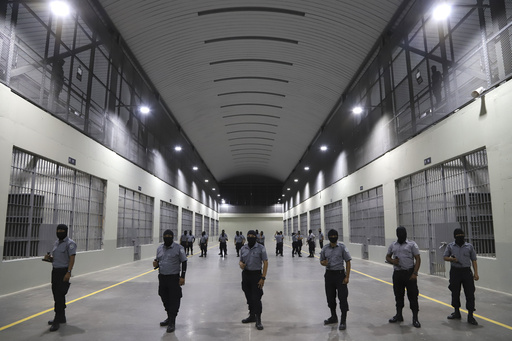
President Donald Trump expressed interest on Tuesday in potentially acting on an offer from El Salvador to accept and detain violent American offenders in extreme cases, despite acknowledging there are significant legal concerns. This came after Secretary of State Marco Rubio negotiated an unusual arrangement with Salvadoran President Nayib Bukele, permitting the Central American nation to take in U.S. deportees, including American citizens and lawful residents convicted of serious crimes.
“I would pursue this in an instant if there were a legal basis for it,” Trump stated during his remarks in the Oval Office. “We are currently assessing whether such a legal framework exists.” Meanwhile, Rubio emphasized during a press conference in San Jose with Costa Rica’s President Rodrigo Chaves that “there are clear legal stipulations we must adhere to. Our Constitution must be respected.” He noted, however, that El Salvador’s proposal was notably generous, as it allows for the outsourcing of some of the most perilous criminals away from the U.S. at a lower cost.
The focus on immigration, a significant topic for the Trump administration, was once again highlighted during Rubio’s inaugural overseas trip as Secretary of State. His five-nation Central America tour has been challenging, particularly due to disruption within the U.S. Agency for International Development (USAID), leaving staff and State Department employees anxious about job security.
While Rubio was overseas, USAID staff and Congressional Democrats were barred from entering the agency’s Washington D.C. headquarters after Elon Musk, tasked with leading a budget-reducing Department of Government Efficiency, declared an agreement with Trump to dissolve the agency. Thousands of USAID personnel have already faced layoffs, and programs worldwide have been halted following a broad suspension of foreign assistance initiated by Trump upon his arrival in office. Although Rubio later proposed waivers for programs essential for survival, uncertainty regarding eligible programs and ongoing fears of losing U.S. aid permanently have put further strain on international aid initiatives.
“If an organization receiving U.S. funding doesn’t know how to process a waiver, I seriously question their competency,” Rubio commented, reflecting on the situation. He reiterated his support for foreign aid, emphasizing that each dollar spent must further U.S. national interests.
While discussions between Rubio and Chaves turned to immigration and security issues, Costa Rica is facing its own challenges, shifting from merely being a transit country for migrants heading to the U.S. to becoming a destination for many Nicaraguans following crackdowns on opposition in their home country that began in 2018. Additionally, Costa Rica has seen rising drug-related violence in the past two years. “We recognize the need to enhance our efforts against international organized crime,” Chaves stated, noting Rubio’s commitment to facilitate U.S. assistance through waivers for ongoing support.
Following his meeting in Costa Rica, Rubio headed to Guatemala City to meet with President Bernardo Arévalo. This came after his earlier discussions in San Salvador with Bukele, who confirmed the deportation proposal in a recent post, indicating that El Salvador had opened the door for the U.S. to outsource parts of its penal system.
Bukele clarified that the offer would be limited to “convicted criminals” and that a fee would be applied, deemed modest for the U.S. yet substantial for El Salvador, ensuring the sustainability of the nation’s prison system.
The State Department has labeled El Salvador’s overcrowded jails as “harsh and perilous,” mentioning significant inadequacies in basic provisions like sanitation and potable water. With rampant gang violence, the country has been under a state of emergency since March 2022, leading to the suspension of fundamental rights and the detention of over 83,000 individuals, often without due process.
In recent developments, Bukele inaugurated a vast new facility designed to accommodate 40,000 gang members and restricted food provisions to two meals daily, eliminating inmate visits and failing to provide any reintegration programs.
El Salvador, once infamous for its violence, marked a historic low of 114 homicides last year, a shift which has significantly boosted Bukele’s popularity among the country’s approximately 6 million residents.
Migration has been a primary concern for Rubio throughout his trip, which includes Panama, El Salvador, Costa Rica, Guatemala, and the Dominican Republic. However, he has also faced challenges posed by the ongoing changes initiated by the Trump administration. Reports indicate that he has taken on the role of acting administrator for USAID but has delegated operational authority, indicating ongoing organizational changes.
In a letter to legislators obtained by various media sources, Rubio noted that the State Department will collaborate with Congress to reorganize certain sectors of USAID. He remarked on the disorganization within the agency that has complicated foreign relations initiatives and stated that USAID could potentially be restructured or even diminished in accordance with applicable laws.

